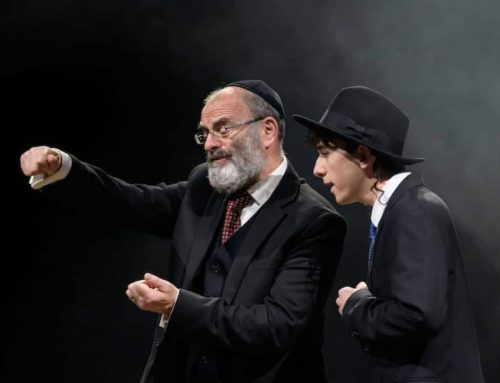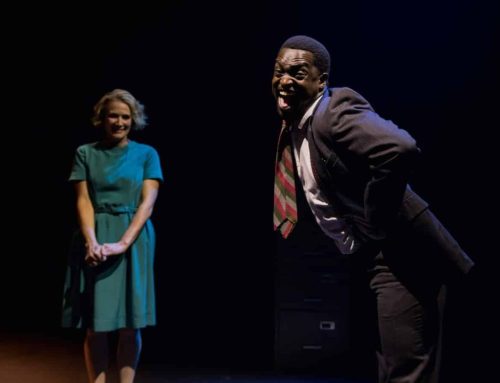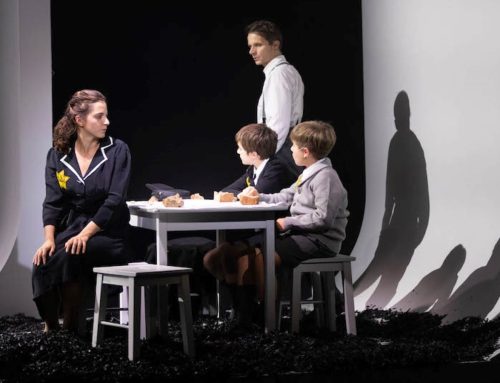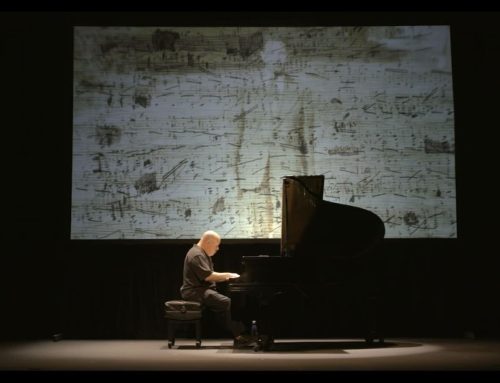The show blurb for director Igor Golyak’s production of The Wanderers quotes a review from The Wall Street Journal describing the piece as “the finest play of the year”. No offence to that esteemed organ, but one wonders which year and which universe. It certainly is not London, 2025. Seemingly, that review was for a different production with a different director, but surely the play itself cannot have changed that much.
In this iteration, Anna Ziegler’s writing is too often wordy, and the narrative is gratuitously overstuffed. The dialogue oscillates between over-engineered and emotionally remote naturalism and self-indulgent essay. It is hard to summon up an iota of empathy for any of the characters, bar one. The contrived symmetry between two troubled marriages—one set in the 1970s and one in the 2010s—feels hollow at best. Jan Pappelbaum’s gimmicky set looks like an installation for brainstorming in a Gen Z office. One broadly satisfying slow-burn plot twist works well, but a final-act zinger comes out of nowhere and quite literally beggars belief. Perhaps the Marylebone Theatre and New York exist in a kind of Nick Payne-style parallel universe.
Abe (Alexander Forsyth channels a pompous, patrician, humourless Woody Allen) is a Pulitzer Prize-winning writer who won a US National Book Award before he was 30. It is hard not to dislike the man on that basis alone, but one strives to be fair. You will end up disliking him anyway. Abe writes novels that “touch on the American Jewish experience”. He describes himself as “reticent in life and verbose on the page”, but really, he is verbose everywhere. He writes a confession of love to his wife, couched in the form of a round-robin letter to his college alumni: even intimacy, for him, is a literary construct.
Abe’s wife Sophie (Paksie Vernon) is also a novelist, though a much less successful one. That is just as well, as Abe prefers Sophie to look after the kids while he writes (at one point underneath the kitchen table). She, too, is a secular Jew, though having a black father, she shares the twin “inherited traumas of the holocaust and slavery”. The couple are childhood friends, though naturally they only fell in love when Abe began reading Philip Roth’s poetry to her in the car. “I felt seen”, she tells us.
The couple’s marriage is unhappily happy, as New York literati’s marriages often are. “There’s a small way in which my wife hates me,” Abe confesses. His solution to her ennui? “Let’s re-see each other!” The duo have a gentle ongoing competition about who reads the most articles in the New Yorker each week. Both are manipulative in their own ways. Do couples like this really exist outside of concept-driven fiction?
A complication arises when Hollywood superstar Julia (Anna Popplewell oozing sultry self-confidence) attends a book-reading given by Abe. Julia also has two kids and a comfortably miserable marriage, so there is common ground between her and Abe. Entranced by the “smart, beautiful, unobtainable” actor, Abe sets about “corresponding with Helen of Troy”. She is filming in Australia (a version of Philip Roth’s Everyman, naturally), so the love affair that ensues is epistolary – conducted in ever-more essayistic prose. “You think words are a refuge, Abe, but they’re a cul-de-sac,” Julia says, which may explain why she ghosts him after a while. Lovestruck, Abe begins to question his marriage.
As if the narrative is not busy enough already, Ziegler gives us a second interweaving storyline involving Abe’s attempt to understand his ultra-orthodox Hasidic parents (who had an arranged marriage) through writing about them. Dad, Schmuli (Eddie Toll), turns out to be a weak-willed, moralising dud who subcontracts decision-making to his own father. Mum, Ester (Katerina Tannenbaum gets the best of the evening), wants to be a librarian and take control of her own body, but faces a choice between her faith community and free will. Her choice—one deserving of the only empathy one can summon up in the entire piece—has a profound impact on Abe’s life. Subsequent parallels between the two couples feel tenuous and forced.
Jan Pappelbaum’s high-concept white-and-silver, snow-strewn set features a Perspex screen that extends left to right across the stage, with action constantly shifting from behind to in front of it. Characters carry pens and draw in cartoons to represent aspects of the environment. We hear about a house, and someone draws it. Ditto for cars, people, and at one point, the Brooklyn Bridge. We get unsmiling emojis when someone refers to sad kids. It is a self-consciously literal conceit, apt perhaps for a play that foregrounds ideas at the expense of character or emotional connection. The Wanderers is a play of meticulous architecture and grand ambition, but it is as emotionally barren as they come.
Writer: Anna Ziegler
Director: Igor Golyak
New – Online Shop!
My collected theatre reviews now available in paperback format for the years 2022 and 2023.
Just £10 per copy.
Over 100 reviews in each book.
- John Cutler’s Collected Theatre Reviews – Volume One. 2022. Paperback. 296 pages. ISBN 9781805179757. £10
-
John Cutler’s Collected Theatre Reviews – Volume Two. 2023. Paperback. 284 pages. ISBN 9781836884170. £10
Visit my Online Shop or click on Buy Now to order your copies.
More Recent Reviews
The Sea Horse. Golden Goose Theatre.
The Sea Horse, Edward J Moore’s grim slice of mid-century realism, debuted to solid reviews off-Broadway in 1974. Since [...]
Garry Starr: Classic Penguins. Arts Theatre.
Emperor penguins’ shortish treks between sea and nesting sites are about as peripatetic as your average Thameslink commuter. Garry [...]
When the Clarion Came to Call. Cockpit Theatre.
When, upon entering an auditorium, you are told, ‘Take as many pictures as you like, but mind the ceramics,’ [...]








